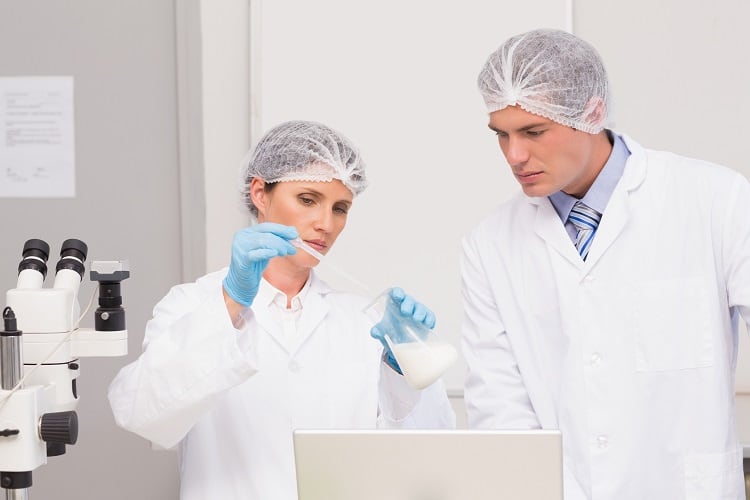Precision fermentation technology enables the programming of micro-organisms to produce complex organic molecules, such as protein.
The technology can be leveraged to develop animal-based proteins – such as casein or whey – so as to recreate dairy products, without the cow. Commercialised examples to date include US-based Perfect Day’s whey protein beta-lactoglobulin, which is sold B2B to brands in milk and ice cream categories, and Impossible Foods’ precision fermentation-derived heme ingredient.
Although available on-shelf – at least in the US (the EU is yet to approve a precision fermentation-derived dairy alternative for market) – precision fermentation proteins have not yet reached the scale required to truly disrupt their conventional counterparts.
It’s not the innovation that’s lacking, suggested Dr Jeremy Chignell, senior fermentation scientist at US-based BIO-CAT Microbials – a GMP certified facility that supplies to the precision fermentation sector, amongst others – and former senior fermentation specialist at the Good Food Institute (GFI).
“We always need more innovation… certainly there are so many companies out there doing amazing things from a scientific perspective,” he told delegates during the recent Future Food Series: Precision Fermentation webinar, co-hosted by ProVeg Incubator and Zintinus.
“But I do think that at a certain point, the industry is going to ask itself: ‘Can this make money? Can this become ubiquitous enough that consumers will get over some of the hesitations they might have?’”
Fermentation capacity
To get there, the precision fermentation sector is up against a number of hurdles. The ‘biggest’ obstacle, according to Dr Chignell, lies in scaling up production.
“I think the biggest constraint right now, as far as turning this from a lot of very energetic start-ups doing brilliant work at smaller scales…into an industry at scale…is, to put it bluntly, tank space in the world.
“Where are we going to grow these organisms? How are we going to make enough ovomucoid egg protein or casein or whey? Where are we going to make this at the kind of scale we’re talking about, from a bulk protein perspective?”
To disrupt the conventional protein market, precision fermentation-derived proteins will need to compete. Commoditised proteins from the animal industry are made for ‘next to nothing’ and sold at ‘tiny margins’, the fermentation specialist stressed.
Competing with this business model, in the long-term, presents a challenge to this nascent sector, particularly given the current constraint of fermentation volume.
The vast majority of fermentation capacity is owned by multinational ingredients suppliers. “If they don’t want to make alternative protein, where are we going to make it?
“I think that is one of the biggest constraints, and one of the biggest hurdles, that the industry has to face.”
That is not to say that ‘the DuPonts and the Cargills’ of the world don’t want to be involved. They do, according to Dr Chignell. “Those are just two examples, but there are many, and they are at the forefront of alternative proteins. They want to be involved. They see the market, they see where it’s heading – they want to be a part of that.”
The issue is that much of world’s fermentation capacity is already spoken for, be it for pharmaceuticals, for other food products, or bio commodities such as lactic acid.
“Are they interested in converting their huge capacity of lactic acid, where they make a lot of money, over to make proteins for food consumption? It’s not even clear if you can do that conversion to food consumption…”
The fermentation scientist sees potential in a ‘middle space’, between start-up capacity and the 300,000L capacity used by multinational ingredient suppliers.
“There is certainly a lot of space in between, so that may be a sweet spot for companies looking to scale up. The investment is not prohibitive…and once you can demonstrate you can make it [at that capacity], then when some ‘huge scale’ commercial capacity does become available, you’ll be ready to go and have the process in place.”
Dr Chignell continued: “Nobody wants to say: ‘I made it in my 100L pilot scale, so I’m ready to go to 300,000L’. That’s not a rational approach. That would be a hard lesson to learn for any company.”
What about consumer acceptance?
Aside from regulation, which is of course a major barrier in commercialising precision fermentation-derived foods, the other key challenge in achieving market success lies in consumer acceptance.
Germany-based precision fermentation start-up Formo, which is targeting the cheese market, recently surveyed consumers from the UK, Germany, Singapore, and the US, to find out how they react to the general concept of precision fermentation.
Formo conducted the research in partnership with Mercy For Animals and Fordham University.
Concerning the production method, a majority of respondents expressed either a desire for deeper understand of the process or unease. “Many wanted to know whether the product was natural or artificial, leading from here into questions of how safe the product would be and what bodily effects it might have, with some looking for data that could answer these questions for them,” wrote the report authors.
What regulatory expert Hannah Lester took from these findings, is that the ‘biggest issue’ concerning consumer acceptance is safety. Consumers are looking to regulatory authorities to ‘rubber stamp’ these products and ‘say they’re safe’, she told delegates at the Future Food event.
“If the regulatory authorities say they’re safe, then consumers are more likely to try these products,” stressed Lester, who is CEO and Principal consultant for Amgen Regulatory Consulting and Head of Regulatory Affairs at French cultivated foie gras start-up Gourmey.
Founder and CEO of Fermify Eva Sommer believes consumers are ready – particularly in the cheese category.
Fermify is an automated production platform for large-scale milk protein production. Before founding Fermify, Sommer was co-founder and CPO of cultivated fat start-up Peace of Meat – which was acquired by Israeli 3D-printed cultured meat company Meat-Tech 3D.
The plant-based milk alternative category is case-in-point, Sommer argued. When these products first launched, they were difficult to find and ‘weren’t even good’. Thanks to increased market penetration and improvements in R&D, perception for plant-based milk is ‘really high’ today. “We’ve already reached a point where no further improvement is required, because people already love it.”
In the plant-based cheese category, however, R&D is not quite there, we were told.
“Plant-based cheese is not good at all. Most of the time it’s a clump of fat and starch and people don’t like it…I have perceived within the last two to three years that people are really hopeful for precision fermentation-derived proteins for cheese just because there is no alternative for it.
“People want to be plant-based, but they don’t want to sacrifice cheese.”
As long as the product is not unhealthy, consumers are ‘really ready’, Sommer continued. Consumers from different generations and different geographies are ‘really open to it’, it really ‘blows their mind’ that we can produce it ‘without the cow’.
Setting the narrative
Aside from scale, financing, regulation, and consumer acceptance, what else could prevent precision fermentation-derived foods from achieving market success?
According to regulatory expert Lester, the sector should be prepared to combat ‘kickback’ from traditional farming stakeholders.
“I think this could potentially be very big, particularly with the farming stakeholders and the powerful lobbies they have. I think this could be a potential barrier,” she told the event.
To combat these lobby groups, the precision fermentation sector will need to ‘set the narrative’, engage with traditional farming stakeholders, and of course engage with consumers.
“We [cannot] allow the people that are against this industry to set the narrative and start calling it a ‘Frankenstein food’ like we did with the GMOs back in the 90s.
“So I think that’s something that could be a potential challenge, but we do have an opportunity to set the narrative and engage and educate people on what we’re doing and why it’s a good idea.”




